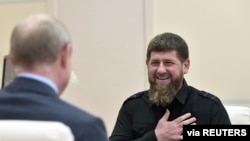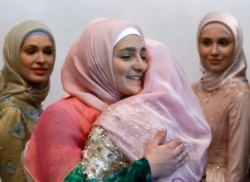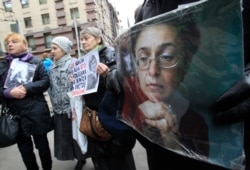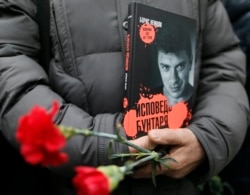The U.S. Department of State has announced it is imposing additional sanctions against Ramzan Kadyrov, the leader of Russia’s southern republic of Chechnya, in a move American officials linked to a pattern of continued human rights abuses by the Chechen strongman.
“The Department has extensive, credible information that Kadyrov is responsible for numerous gross violations of human rights dating back more than a decade, including torture and extrajudicial killings,” said U.S. Secretary of State Mike Pompeo, in a statement Monday.
Under the measures, Kadyrov and his family will be banned from traveling to the United States.
The Chechen leader was already on a U.S. blacklist under the “Magnitsky Act,” a 2012 law that imposed visa bans and asset freezes on Russian officials linked to human rights abuses. The law is named after Sergei Magnitsky, a 37-year-old auditor-turned- whistleblower who died in a Moscow prison in 2009.
Kadyrov responded to the latest penalties with a photograph posted on his Telegram account, in which he brandished two machine guns and posed amid a large weapons cache.
“Pompeo, we accept the fight,” wrote Kadyrov. “Things will get even more interesting.”
Russian Foreign Ministry spokeswoman Maria Zakharova also said Moscow would find a way to respond appropriately to the sanctions.
“It will be difficult to respond tit-for-tat, but we will think of something,” said Zakharova.
Secretary Pompeo’s statement indicated the restrictions would also apply to Kadyrov’s wife, Medni Kadyrova, and his daughters, Aishat Kadyrova and Karina Kadyrova — a decision the Chechen leader took issue with in an additional post online.
“Well, OK, even if I violated human rights a hundred times over, how then do you explain sanctions against… my wife and my daughters???” wrote Kadyrov.
“What crimes have they committed and whose rights have they violated?”
A pattern of terror
Kadyrov has been at the center of accusations of human rights abuses and killings since formally taking over as head of the Chechen Republic in 2007. In effect, he took over the leadership post from his father, Akhmad Kadyrov, who was killed in an assassination bombing while watching a football game in the capital, Grozny, in 2004.
Critics have cited a pattern of terror waged against the younger Kadyrov’s critics in the years that ensued.
In 2006, Anna Politkovskaya, a crusading journalist who detailed human rights violations and disappearances under Kadyrov’s rule for the independent Novaya Gazeta newspaper, was shot in the elevator of her apartment building in Moscow.
Three years later, in 2009, Natalia Estemirova, an aide worker who worked alongside Politkovskaya, was abducted by armed gunmen in Grozny and later found murdered at the side of a highway.
Gunmen tied to Kadyrov’s personal militia have also been linked to the shooting death of Boris Nemtsov, a former deputy prime minister-turned-opposition politician, on a bridge outside the Kremlin in 2015.
More recently, various reports placed Kadyrov at the center of an effort to torture, abduct and kill a member of Chechnya’s LGBT community.
Europe, too, has expressed outrage over a pattern of assassinations of Chechen refugees — many of them perceived enemies of Kadyrov — in recent months.
The statement by Secretary Pompeo noted that the U.S. had joined 15 other nations in creating a fact-finding mission against the “horrific reports of abuses against LGBTI persons, human rights defenders, members of the independent media, and other citizens who ran afoul of Mr. Kadyrov.”
Despite international condemnation of Kadyrov, the Kremlin is widely seen as tolerating the Chechen strongman’s behavior in exchange for maintaining order in Russia’s Muslim-majority North Caucasus.
Previously, Moscow has labeled allegations against Kadyrov as “unproven” and sanctions “illegal.” Kadyrov has always maintained he is innocent of any human rights abuse charges.
Russia fought two bloody wars against Chechen separatists in the 1990s, with the Kadyrovs initially battling alongside the rebels but later striking a deal with Russia’s then-new President Vladimir Putin.







